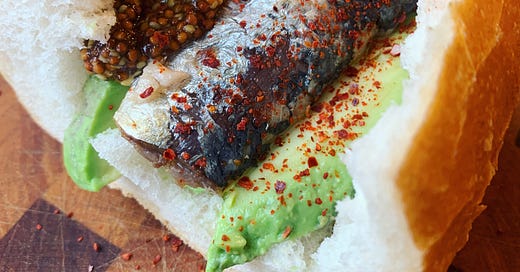Sardines with Avocado and Mustard on a Crusty Baguette
there are a lot of prejudices and misconceptions you have to unpack, sardines don’t have to be one of them.
Things you’ll need: Canned sardines, whole grain mustard or a Dijon or some other kind of fancy mustard in your fridge, an avocado, optional Aleppo chili flake (or hot sauce or something else spicy), and a crusty baguette.
Chapter 120
There are some foods that you did not grow up with and have been relegated to the Yucky column of your internal food categories. It’s easy to dislike things that you have never had. Sometimes you feed picky eaters and they say things like “I don’t like that” and then you ask “have you ever had it?” and they often reply “No, but I don’t like it”.
Mostly the picky food eaters understand that you do not eat nor serve things that are not delicious, but that history and confidence mean nothing in the face of the unfamiliar items that are prejudged to be gross. Take the brussels sprout or lima bean, for instance. You grew up maybe believing that they are gross. You do not know why you thought that. You assume that you saw some sitcom or pop culture something that told you they were gross and you had no other reason to believe otherwise.
This is also how white supremacy, religious intolerance, homophobia, misogyny, xenophobia, and other prejudices work. You take in these messages throughout your entire life and, generally, are never asked or encouraged to question them, and so they become Truth to you: girls wear pink, boys wear blue, gender is determined by genitals, black people are criminals, people with accents are stupid, all women want to have children, men financially support their families, gay men are constantly trying to seduce straight men, gay women all dress like men, Muslims hate Americans, Jews are cheap, addicts are poor, people from the south are ignorant, people from the north are all socialists, and other things too vile to mention.
You have spent the last many years (possibly a lifetime) untangling and dismantling all of these problematic and perpetuated beliefs. You are working on it. You have books that help you unpack, relearn, examine, and encourage you to undo this lifetime of biased teaching. You go to webinars, you engage in conversations, you google words to find out if they have racist origins. You are learning to listen. You know that there is a lot of work and that you will never be done learning. You understand that this is an active and constant process, no pats on the back required.
Although your food prejudices are far less harmful than the human/cultural ones, they are worth examining too. Brussels sprouts, after all, are very delicious (one of your favorites, actually) and there are a great many perfect concoctions that highlight the creamy, buttery deliciousness of the Lima bean.
You have always believed that you do not eat sardines unless you have to. They are relegated to apocalypse food prep and you are pretty sure that you saw at least one cartoon about a cat family eating them because it was winter, they were starving, and there were no other options. You do not like them, you think. But you have thought many wrong things and this is why you took a chance and bought a can of sardines.
Yes, your fingers will stink a little if you touch them, just like with garlic and you eat plenty of that. Yes, they have skins on and tiny bones and sometimes even heads, but so do chickens and you’ve managed to eat those your entire life.
Open a can of the oil-packed sardines or even the mustard-packed ones. Did you know that they are sometimes packed in tomatoes or chili? Grab a crusty baguette or even a package of saltines (much recommended). Plop on some mustard and sliced avocado.
Don’t be afraid when you pull out the sardine. It’s meaty and delicious, even if you don’t know it yet. Make yourself a little open-faced sandwich, sprinkle it with some Aleppo chili flake, gochugaru, or hot sauce, and bite into it like you expect to like it.
Unpacking a sardine and challenging your tinned fish prejudice is easy, way easier than all the other problematic beliefs you are still uncovering and confronting, relinquishing, and hopefully abolishing. You know that there is a lot of work to actively engage in and a variety of uncomfortable (necessary) conversations to have in order to undo the harm that these beliefs have perpetuated in society and within your own self.
Change is hard work that takes risk. Take risks and believe that they will be worth it, even (especially) if you haven’t tried it yet.
As always, thank you for subscribing!
If you’d like to support this work, please consider becoming a paid subscriber, sharing, forwarding, or otherwise spreading the word about this project. Leave us a comment or drop us a line at eatwellenough@substack.com.





So.much.yes.